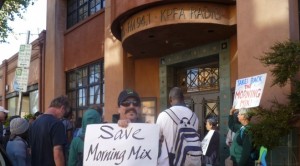Originally printed in Oakland Local http://oaklandlocal.com/2014/06/kpfa-community-radio/
Reprinted in SF Gate
Is KPFA Community Radio Going Extinct?
With its recent street protests, office occupations, and renegade broadcasts, Berkeley’s community radio station KPFA (94.1FM) typifies what people mean when they use the word “Berserkeley.” However, these confrontations are not merely some beatnik brouhaha, but in fact represent an existential threat to the future of community radio, and implicate one of Oakland’s current Mayoral candidates, Dan Siegel.
The most recent dispute is over the abrupt replacement of the locally-produced 8 a.m. show The Morning Mix with a radio program from LA called The Uprising, ostensibly because the new show will generate more revenue during pledge drives. In response to being rescheduled and shortened, the hosts of The Morning Mix held protest rallies outside the KPFA building and took over the studio on May 26 to air their concerns.
According to Andrés Soto, one of the hosts of The Morning Mix‘s five rotating shows, “I was really displeased that the morning mix has become a political football between rival factions…the morning mix, as an expression of authentic community voices, is what deserves to be heard.”
But, according to Richard Pirodsky, the Interim General Manager of the station, “The problem was that even though it had been on the air for three years, only one of the five Morning Mix shows was generating enough listenership and audience to even come close to justifying being in that golden hour.”
Supporters of The Morning Mix are organizing to attend the Community Advisory Board meeting in Oakland this Saturday, as well as hosting a “Save The Morning Mix” barbecue in Berkeley this Sunday, in hopes of pressuring the station to restore the show. While this disagreement and protest may not yet sound worthy of the “existential crisis” label, the story gets much deeper.
The radio station, founded by conscientious objector Lewis Hill in 1949, was the first of what would become the Pacifica Radio network: five stations across the country that are independently operated without any corporate sponsorship. While the accomplishments of this network are many, the predominantly listener-funded, locally-produced shows have struggled to contend with NPR’s corporately-underwritten programs, and with their own ideals of democratic, community-oriented radio.
In 2001, after 3 years of protests and lawsuits following an email leak, the Pacifica board signed a settlement that democratized the governance of the stations, allowing listeners to elect the members of their Local Station Board. Each LSB is comprised of 18 elected listeners and 6 elected staff members. These 24 “delegates” are tasked with forming the annual station budget, filling station management positions, and ensuring the mission of community radio. From these delegates, 4 “directors” are elected yearly to represent their station in the Pacifica National Board, which sets network policy from offices next door to KPFA.
While this settlement was intended to create a truly representative and listener-directed model of community radio, the reality has been more challenging. Chronicbudgetary problems (and their disputed “causes”), opposing visions for the future of the station, and abrasive implementation of management and board decisions (as in abruptly firing the former Executive Director Summer Reese, or canceling The Morning Mix), has led to regular confrontations among the various staff cliques, who at this point openly refer to themselves as “factions.”
At KPFA, the central rift is between the Support KPFA — United For Community Radio (UFCR) faction and the Save KPFA faction. UFCR is the more radical, community-oriented group, while Save KPFA is aligned with the views of management and directors, and, importantly, Dan Siegel, who has a long history with the network and, according to savekpfa.org, was a “representative on the Pacifica National Board until he stepped down in January to run for Mayor of Oakland.”
Many of those sympathetic to the UFCR faction accuse Dan Siegel and Save KPFA of bullying, ignoring legal conflicts of interest, and trying to take over the network in order to sell off the East Coast stations. On the other hand, Save KPFA has accused UFCR of union-busting, sabotage, and trying to take over the network in order to, well, just to take it over.
This is where the existential threat comes in. UFCR is afraid that the station is going to lose sight of its community-radio mission to represent diverse and underserved points of view, and that the historic Pacifica network will be dismantled in the process. On the other hand, Save KPFA is afraid that the governance of the station and the network are excessively democratic, to a point where compromise on the revenue vs. community issue is unattainable and that UFCR will lead Pacifica into bankruptcy.
As Richard Pirodsky, the IGM who made the decision to replaceThe Morning Mix, put it, “they have in some ways been so mission-driven in terms of trying to bring diverse programming that you can’t find elsewhere on the dial, almost to the exclusion of worrying about whether we can afford to continue to do it.”
And this is where the “Berserkeley” side of this situation comes in. Save KPFA currently has enough of a majority with the Pacifica national board to preempt democracy by firing who it wants to fire and cancelling the shows it wants to cancel, leaving UFCR no other options besides protest, occupation and litigation.
There seems little chance of this situation being peaceably resolved, and realistically, this feud poses the greatest threat to the future community radio, but at least we can savor the irony of Save KPFA’s decision to replace The Morning Mix with The Uprising.

